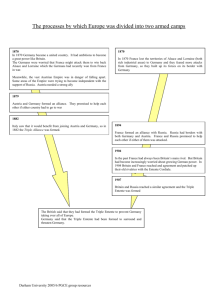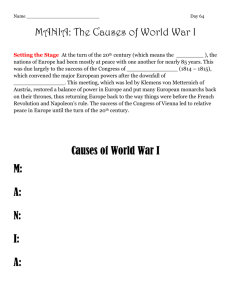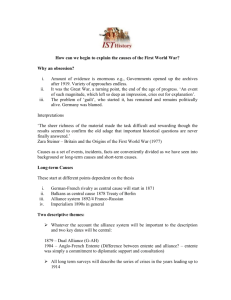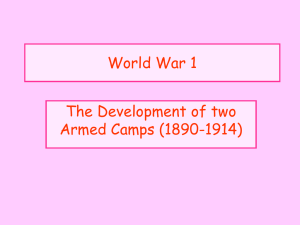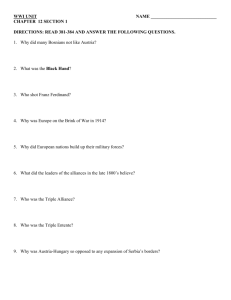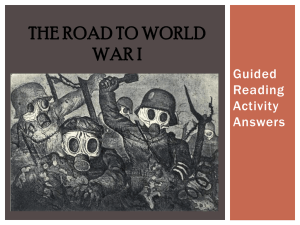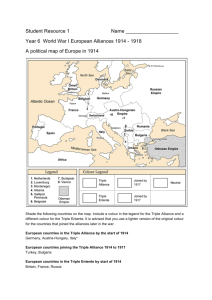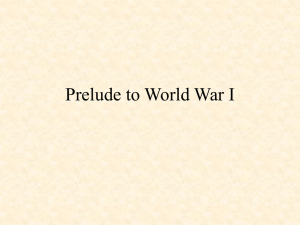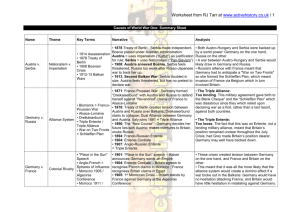JCC-The Triple Entente
advertisement
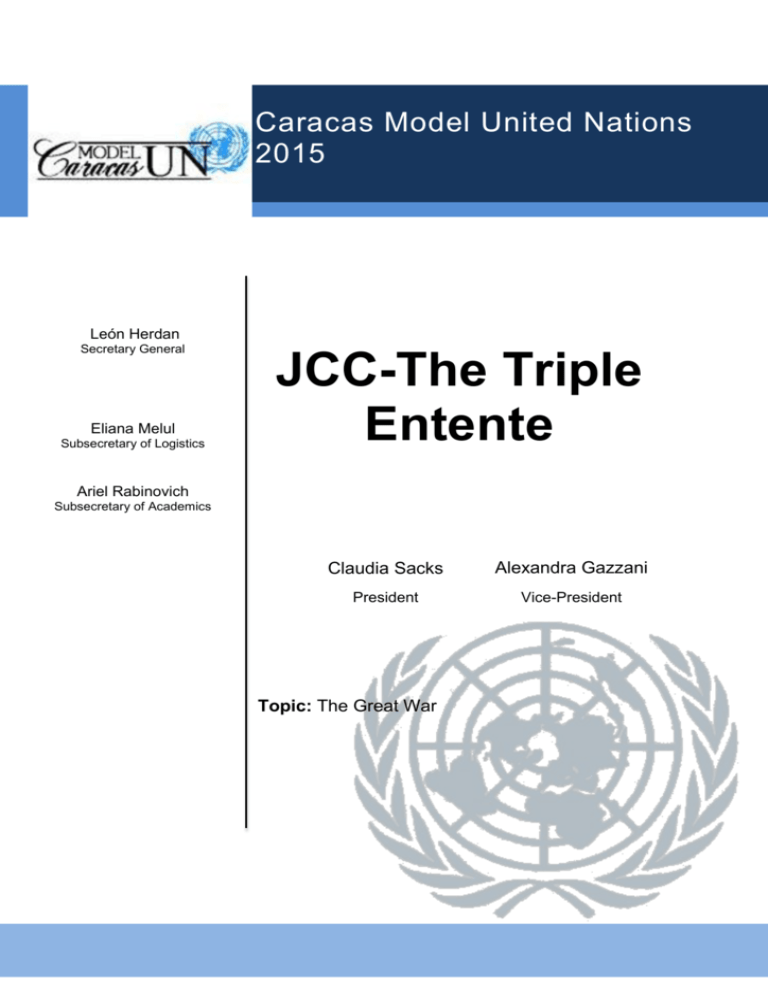
Caracas Model United Nations 2015 León Herdan Secretary General Eliana Melul Subsecretary of Logistics JCC-The Triple Entente Ariel Rabinovich Subsecretary of Academics dan Secretario General Eliana Melul Sub-Secretario de Logística Ariel Rabinovich Sub-Secretario de Académicos Claudia Sacks Alexandra Gazzani President Vice-President Topic: The Great War JCC-The Triple Entente 2 JCC-The Triple Entente Index I. Letter from the Secretary General ................................................ 4 II. Letter from the Chair .................................................................... 5 III. General Introduction .................................................................... 6 IV. Committee Context....................................................................... 12 V. Bibliography.................................................................................. 18 3 JCC-The Triple Entente Letter from the Secretary General Dear delegates, faculties and invited guests: Welcome to the Fifteenth Edition of the Caracas Model United Nations. As in the past editions, this year we are seeking to maintain the success that has accompanied CaMUN’s name in our previous fourteen years, of course, always basing ourselves on principles of diplomacy, commitment, dedication and excellence, all of which constitute the pillars over which we have constructed this Model over the years. This edition is based again in regular and special committees, both in Spanish and English, which will review hundreds of years of history, traveling from the times of the First World War until the actual diplomatic relations between Cuba and the United States of America. We have nine committees; each one of them will have its own discussions and debates on actual conflicts that move the world, facing controversial topics like the racist struggles, represented by the Apartheid, and the religious struggles, represented by the expansionism of radical Islam. Even, as it is has been a tradition in our Model since many years ago, we have committees for debating uniquely philosophical issues, which will put in doubt many of the most basic concepts and knowledge’s of the present, and will find answers in the Ethics and Metaphysics. It is in the hands of each and every one of us to make the best of this new edition of CaMUN, where we will have the opportunity to give the best of us, learn from others through dissertations and constructive discussions, and experiment within high level sessions the true meaning of confronting and search for solutions to the problems that affect the humanity today, or, those who faced our predecessors in earlier times, from which we can learn and propose new and creative solutions. In the name of the Organizer Committee of CaMUN 2015 and me, it is a great honor to welcome you once again time to our home, the Colegio Moral y Luces “Herzl-Bialik”, the 15th, 16th and 17th of November. Best Regards, León Herdan Gampel Secretary General “We will have to repent, not for the violent actions of the bad people, but for the appalling silence and indifference of the good people” -Martin Luther King 4 JCC-The Triple Entente Letter from the Chair Dear Delegates of the Triple Entente Committee, It is our pleasure to welcome you to CaMUN 2015 and particularly to this committee. We hope you are as thrilled to participate in this Model United Nations, as we are to host it. This guide will serve as a starting point, where you will find that during the course of the three days, you will be able to change history with your ideas and actions. The committee will be situated in the years that transcurred from 1914 to 1918. The delegates have the objective to be a step ahead of the Triple Alliance, which can only be achieved by an active participation of each and every person represented in the committee. Since this committee is not a regular one, we encourage you to research, create and think out of the box when it comes to proposing plans or giving your opinion. By that it is meant to go beyond the logical sequence of facts and to propose distinct and original ideas in order to confront the problem. We want and hope this conference will be an opportunity to learn and to use your previous Model United Nations experience and, if this is your first one, to familiarize yourself with MUN context in a less protocoled way than it would be in a regular committee, not taking away the fact that same rules apply when referring to behavior. We’ll be pleased to answer any question that surges (by contacting me at claudia.sacksm@gmail.com or the vice-president at alexgazzani@gmail.com ), and encourage you to use this guide and to research so you may understand the situation completely, which will make the experience even more prolific. See you soon! Claudia Sacks Alexandra Gazzani President Vice-president 5 JCC-The Triple Entente General Introduction Introduction After the Napoleonic wars ended in 1815, Europe enjoyed relative peace with no World Wars or wars between countries being fought, due to the “Balance of Powers” created in the Congress of Vienna. The European population after these wars started to hate all forms of violence and confrontation. This relative peace reigned in this continent for almost a century until the Great War erupted in 1914. The war was provoked by Germany as they expanded their naval supremacy and colonial campaigns, something that worried the British, French and Russians. These countries leaders were ready for a war long before 1914 but not until this year, due to the killing of the Archduke Franz Ferdinand, heir to the Austro-Hungarian, the war took place. Committee Structure and Operation This committee will work as a crisis informal committee, having English as its official language. There will be a continuous moderated caucus, and the delegates will have the chance to open an unmoderated caucus, previously approved by the Chair. There will be several crises sent by the Crisis Staff to improve the debate or to start a new topic of discussion. Also, there will be crises sent as a result of the directives or action plans developed by the delegates, or also as a result of the actions taken by the other chamber of the Joint Crisis Committee. 6 JCC-The Triple Entente Representatives in the Entente Chamber Herbert Henry Asquith: was born the 12th of September in 1852. He began his political career as a Prime slogan, “your country needs you!” became famous during this period of time. Minister of the United Kingdom in 1908. During this period of time, he Edward Grey: was born the 25th of directed his Liberal party into various April 1862. He was a British liberal reforms, the statesman and from 1905 until 1916, reduction of power of the House of he assisted as a foreign secretary. Lords, but most importantly, he He is best known for his comment involved his nation during the World during the First World War “The War One. During the Great War, lamps are going out all over Europe. Asquith’s job as a prime minister We shall not see them lit again in our came to an end as a and in 1916 as life-time.” In the early days of war, a and Grey believed that a negotiation with political crisis created due to his Italy, the Arab rebels, France and weakness and delay in his actions. Russia (being a signatory of the which consequence included of military Sykes-Picot Horatio Herbert Kitchener: was Agreement) was of great importance. th born the 24 of June 1850. He was a senior British army officer and a Reginald McKenna: was born the colonial creating 6th of July 1863. He worked as imperial campaigns all over the Asquith’s Home Secretary and then nation. Asquith named him secretary as Chancellor of the Exchequer of the state for war at the beginning during wartime, were he inflicted an of World War I. Within his job, he additional income tax and import was able to organize a volunteer duties with the objective of creating a army and a mass production of fund for war. administrator, weaponry made to fight against Germany. His famous René Viviani: was born in Algeria 7 JCC-The Triple Entente the 8th of November, 1863. He was 1902 and served until 1912, were he elected for the Chamber of Deputies had already served as the minister of in 1893 were he established, along colonies within the government of with others, the French Socialist Ernest Monis since the 2nd of March Party, which he left in 1906 in order 1911 until the 27th of June of the to take charge as Minister of labor in same year. He served as Minister of Clemenceau’s government up until War 1910. In 1914 he helped form a government of Joseph Caillaux. He government of then entered the government lead by President Poincare. He began as the René Viviani as of June 1914. He foreign minister, but as the monition was blamed for the failing of the shortage began to increase, he was French Plan XVII, and was made to asked to resign in 1915. resign in August of that same year at the demand Raymond Poincare: was born the 20th of August in 1860. He became premier and foreign minister as of January 1912 succeeded and after Fallieres 1911-1912 in the and joined the army as a reserve captain. He was finally made Lieutenant - colonel by 1915. Louis-Jean Malvy: was born the 1st in of December in 1875. He was January 1913, starting his new elected in 1906 to the national career France. assembly were he became the first During his presidential period, he notable, serving as minister of the prepared his country for a possible interior war, armed government. During the war, he forces and increasing the duration of became noticeable for supporting national service to three years. He rebellious newspaper that raised also suspicions in Clemenceau accused as Armand soon from president strengthening strengthened of their alliances with Britain and Russia. in Rene his Viviani’s activities. Malvy of betraying French interests in July and he was forced to resign the 31st Adolphe Marie Messimy: was born st the 31 of August in 1917 and arrested and of January 1869. He was charged with treason in November. elected as Chamber of Deputies in In 1918 he was found culpable of 8 JCC-The Triple Entente negligence in his ministerial duties was born the 8th of November 1839. and exiled from France for five In 1906 he was made prime minister years. but after his first appearance before Nicholas II: was born the 18th of May, 1868 and became emperor of Russia after succeeding his deceased father in 1894. After the defeat of the war with japan in 190405, Russia’s prestige was hardly damaged. As of 1904, 110,000 workers began Petersburg as strikes in St. protests of the declining values of wages. In 1905, a revolution sprouted Duma, government from which received a the vote of censure causing him to resign. In 1914, Nicholas II renewed his career and made him his prime minister for two years after losing Nicholas’s wife’s support. In 1917 during the February revolution, Goremykin was arrested and when freed, he left to his estate in the Caucasus. bloody Mikhail Vladimirovich Rodzianko: Sunday (were strikes and mutinies was born the 9th of March 1859. He spread through the army and navy). was thought to be a reasonable The Tsar published the October Octobrist deputy. During the First Manifesto in order to quiet down World War, he served many war these protests, granting freedom of industry committees since 1915 and conscience attempted and after the speech. Russia to motivate entered an alliance with Britain and industrial France Entente. support a fund for war. He spoke to Nicholas II took personal command the Tsar about Grigory Rasputin as of being in the Triple 1915 in September, but a economy German in Russia’s order spy. to After Russia’s position in war was not the Nicholas’s abdication (supported by greatest and failure was already Rodziank), he was too called upon to expected. He was convinced by the resign. Russian army high command to abdicate in March 1917 and was sent on exile to Britain under a safe haven. Ivan Vladimir Aleksandrovich Sukhomlinov: was born the 16th of August in 1848. He was led as cavalry commander to the Russo- Logginovitch Goremykin: Turkish war of 1877 due to his 9 JCC-The Triple Entente military career. In 1898, he was framed and lost his position after the promoted general and after being a German accomplishments close adviser to the Tsar, he became Minister of War in 1909, where he helped in war tactics and defense strategies. During the July crisis, he assured Nicholas II of the army’s eagerness for combat, even though Sukhomlinov’s actions were feeble and the Tsar brought upon his command to dismiss Sukhomlinov in 1915. He was placed under house arrest in April of 1916 and freed on October due to the Tsar’s persistence. He was then arrested again by the Provisional Government in September 1917 and was then sent to exile in Finland and then Germany in May of 1918. Francois Paul Anthoine: was born in the year 1860. His position when the war started was General Castelnau’s Chief of Staff before receiving a promotion as commander of the French First Army. He provided assistance to the British during their Third Battle of Ypres in 1917. In the same year, in November, Anthoine received another promotion to Commander in Chief although in 1918, he was Vladimir Dragomirov: was born in the year 1862 and served as General in the Imperial Russian Army throughout First World War. In 1916 he served in troops in Galicia and Volhynia, and as reward in May 1917, he received the command of Northen Front armies. Soon, he succeeded Anton Denikin in the Southwestern Front command. As of November October 1918, The Bolshevik Revolution urged Dragomirov to lead as head of the opposition Bolshevik administration. In October 1919, he was appointed Military Governor. Edward Ratcliffe Evans: was born in the year 1881 and was appointed to the Royal navy in 1897. He was made Second in Command of Scott’s Antarctic Expedition in the year 1909. His popularity increased when in 1913, the expedition’s leader died and Evans was left to bring the survivors back to England. When the Great War began, being the Commander in the Royal Navy, he served the HMS broke during the Dover Patrol, where he stud out for confronting six German attackers the 10 JCC-The Triple Entente 20th of April in 1917. When he was confronted other German destroyers aboard the HMS swift, he again were he sunk another two. 11 JCC-The Triple Entente Committee Context Brief History of The Entente (particularly in Africa), the two countries found common ground in The Triple Entente was a diplomatic and military agreement between France, Great Britain, and opposing the expanding German Empire. With the mutual goal of Russia, formed in part as a response containing the expansion of the to German Empire, Great Britain and the formation of the Triple Russia reached an agreement on Alliance. mutual self-defense and the two countries joined together with France to form the Triple Entente. Russia was part of the Three Emperors' League Austria-Hungary along and with Germany which dissolved during the 1880’s, mostly because of the troubles with the Balkans. The Dual Alliance was formed by Russia and France in 1894. A decade later, France formed Precedents an alliance with Great Britain called Since the early XX century the Entente Cordiale. Taking into there were numerous disagreements account that Britain and France had between European countries leading numerous wars and disagreements to think a terrible war was going to and were currently involved in a happen. France and Russia became struggle for supremacy in setting up acquaintances colonies common interests and created the around the world because of their 12 JCC-The Triple Entente Dual Alliance (or the Franco-Russian conquering new African territories Alliance) in 1894. The Dual Alliance and becoming more powerful. The was a political and military pact that year after, a secret alliance was became one of the basic European signed alignments of the pre-World War Austria-Hungary to which Germany era. Germany, assuming it's lack of was attached later on. between Rumania and common interest with Tsarist Russia and Republican France, slowly elapsed the Reinsurance Treaty, a secret agreement with Russia that was signed on June 18th, 1887, which stated that each party would remain neutral if the other became involved in a war with a third great power and that this would not apply if Germany attacked France or if Russia attacked Austria. This meant that in the event of war, France would be against Germany and Russia would side against The Austro-Hungarian Empire. Later in 1899 a Hague Peace Conference was called upon to discuss disarmament but no agreement was accomplished, which In the late XIX century, secret is why, two years later, through meetings were held by Russians and March and May, German and British French, and as mentioned before, representatives tried to negotiate the over Dual Alliance was the an alliance but were these unsuccessful. In the first month of meetings. In May 1882, Germany, the next year, a defensive alliance Austria-Hungary and Italy signed the was signed between Britain and Triple Alliance. This consisted on Japan. On the 8th of April of 1904, military union in defense of any Britain and France settled their attacks made by Russia. All three colonial differences, which led to the countries had the same interest in signing of the Entente Cordiale. The consequence of one of 13 JCC-The Triple Entente Entente Cordiale consisted on a since series of agreements, which marked successfully rebelled against the the beginning of the alliance against Turkish Ottoman Empire. The Austro Germany Austria-Hungary. Hungarian Empire was terrified by Later on, Great Britain, who shared the Pan-Slavism which was the the same point of view as Russia desire of the Slavs to set up their and France, joined them in their own nation’s state. Serbia was seen treaty the as the leader of these movements. countries, In 1876 Serbia conquered Bosnia. creating finally The Triple Entente in However at the congress of Berlin 1904. two years later, Austria-Hungary and which alliance of As Germany consisted the three mentioned and on before, Austria-Hungary signed the Triple Alliance, a secret agreement, to which Italy joined later on, originally formed in May 1882 and renewed slowly just before the War erupted. Germany and AustriaHungary had been closely allied since 1879. Italy gave its support against France shortly after losing North African regions that they wanted to colonize to the French. The treaty provided that Germany and Austria-Hungary were to assist 1815 when the Serbs persuaded the great powers to give back Bosnia to Turkey under Austria Hungary’s protection. Austria- Hungary also dominated the Balkans economically, so Serbia was forced to begin trade links with France and Bulgaria, but Austria-Hungary banned all imports of Serbian pork. Serbia started selling its pork through Bosnia until the Empire annexed this territory. The Serbians appealed to the Russians, but then they were forced to recognize Austria's right to Bosnia. Italy if it were attacked by France without Italian provocation and Italy would assist Germany if Germany were attacked by France. On the other hand there was the conflict between Serbia and the Austro-Hungary Empire which dated 14 JCC-The Triple Entente Around 1912 The First Balkan formed an alliance against Bulgaria. was the Then Bulgaria ordered his troops to members of the Balkan League attack Serbian and Greek forces in (Serbia, Bulgaria, and Greece) and Macedonia. The Bulgarians were Montenegro against the Ottoman defeated; however, a treaty was Empire. The League wanted to take signed between the combatants, Macedonia away from Turkey, which where Greece and Serbia divided up was already involved in a war with most Italy. The league and Montenegro themselves, leaving Bulgaria with declared war on Turkey. The Balkan only a small part of the region. War fought between allies were soon victorious. The Turkish collapse was so complete that all parties were willing to conclude an armistice on December 3, 1912. Then the war with the Ottomans was resumed but the allies were victorious again. Under a peace treaty signed in London on May 30, 1913, the Ottoman Empire all of Albania. Albanian Macedonia and independence Macedonia Bulgaria, between frustrated in Macedonia, looked to Austria for support against Serbia. Tensions in the Balkans reached their worst point in the First World War, which was sparked by the assassination of Archduke Franz Ferdinand 1914 (Explained later on). In lost a lot of European territory, including of 1911, Britain started making preparations for war, and two years later, started every country was insisted upon by the European involved making war powers, and Macedonia was to be preparations. Germany introduced a divided among the Balkan allies. tax to finance a more powerful army and France extended its military service one year (three years in The Second Balkan War began when Serbia, Greece, and Romania quarreled with Bulgaria over the division of their conquests total). Current Situation: August 8th, 1914 in Macedonia. Serbia and Greece 15 JCC-The Triple Entente There were many events that assassination set off a rapid chain of methodically led to the outbreak of events, The Great War, but the one that immediately blamed the Serbian displeased the Austro-Hungarians government the most was the assassination of declared war on Serbia. In a show of Archduke Franz Ferdinand, the heir support for Serbia, the Russian to the empire's throne. He was killed ambassador to Serbia suggested in June 28th 1914 by Gavrilo Princip that the Czar should also mobilize. who was a member of The Black The Czar signed the orders to fully Hand a group formed by five Serbs mobilize on 30 July 1914 as a show and one Bosnian that wanted Serbia of force to Austria-Hungary. The to be free from the Austro-Hungarian next day Germany sent an ultimatum ruling. The assassination occurred to the Russians demanding them to when the archduke visited Sarajevo stop all mobilization activities or face after war. Austria-Hungary announced that it would conduct maneuvers in Bosnia next to the Serbian border which was interpreted as a threat to Serbia. as for Austria-Hungary the attack and Germany declared war on Russia seeing that there was no reply on the ultimatum that was previously sent, and also declared war on France to initiate the Schlieffen Plan. An announcement was made by Italy declaring it would stay neutral in war. Moreover, Britain finally declared war on Germany on the 4th of August. Austria-Hungary declared war on Russia and Serbia declared war on Germany at the Archduke Franz Ferdinand same time, leaving Montenegro to The Triple Alliance and The Triple Entente possibility of rejected there being any declare war on Germany the 8th of August, formalizing World War I. any international mediation to discuss The Committee will begin on the issues they were having. The August 8th, 1914, after War has been 16 JCC-The Triple Entente declared by almost every country their nations, and to make the best involved in the conflict. From this decisions point on, it is up to every member of strategies to lead its Chamber to the the Entente to decide the faith of victory. and plan the best Questions to Consider ● What war tactics should the save? Triple Entente develop? ● What measures could the Triple Alliance use against ● Which cities will create a bigger impact if attacked? ● Should we worry about the us? ● Should ● Should we ask for money to we make attack opposite leadership? through air or land? Or both? ● Should we make any secret alliances? ● How should we train our army? ● What weapons should we acquire? 17 JCC-The Triple Entente Bibliography The melting Pot of World War I. Retrieved 2015, from http://www.johndclare.net/causes_WWI4_AustriaandSerbia.htm First World War. Retrieved 2015, from http://www.firstworldwar.com/source/anglorussianentente1907.htm World War I. Retrieved 2015, from http://www.historynet.com/world-war-i WWI Timeline. Retrieved 2015, from http://www.pbs.org/greatwar/timeline/time_1914.html Assassination of Archduke Ferdinand, 1914, EyeWitness to History. Retrieved 2015, from http://www.eyewitnesstohistory.com/duke.htm The Black Hand Movement, The History Learning site. Retrieved 2015, from http://www.historylearningsite.co.uk/world-war-one/causes-of-worldwar-one/the-black-hand-movement/ World War 1 Dictionary. Retrieved 2015m from http://home.olemiss.edu/~gg/paperhtm/ww1dictn.htm 18
